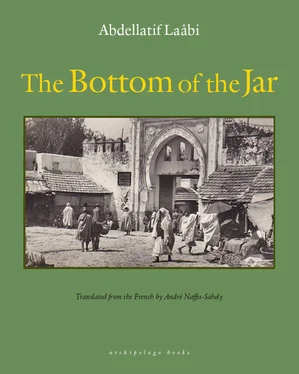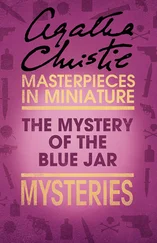These games would last the whole day. Touissa was happy to spend time with Ghita and Driss, despite the fact that this intimacy would begin to wear thin the moment he felt the need to smoke his sebsi. He didn’t dare do it in front of Driss, since even though Driss wasn’t the eldest, he was nonetheless older than Touissa. He therefore owed him some respect. So he waited impatiently for Driss to leave so he could give free rein to his vice. Rather than getting offended, Ghita would encourage him.
“Well, what are you waiting for? Now that your belly is full, you can let your hair down!”
Night came and dinner was served. A simple meal of couscous flavored with sugar and cinnamon and accompanied by a glass of milk. Seeing the disappointment on the children’s faces, Ghita then announced there would be dessert — but only a chhioua (candy) — while winking in Touissa’s direction. The more cunning of the children sensed there was something fishy going on.
The sweets were brought out after the couscous. Ghita put a large raffia plate on the table, which was covered by a cone-shaped lid. Namouss didn’t get it at first. Zhor, one step ahead of him, had figured it out. Shouting in Touissa’s ear, she said, “Lift the lid!”
Touissa didn’t understand why Zhor had asked him of all people, but he did it anyway, and in uncovering the plate discovered there was a large rooster underneath the lid, which leaped on him, all the while beating its wings before flapping off to the other side of the room. This time Touissa wasn’t the only one who was laughing. Everyone in the room was in hysterics. Namouss’s clan certainly came up with some kooky ideas!
An hour after the meal, everyone moved to the couch. Driss lowered the flame on the gas lamp. A sense of peace reigned over the room, and Touissa knew the time had come for him to take center stage. He began by asking everyone to repeat some phrases that would serve as good omens, as well as inspire the storyteller.
“Curse you, Satan!”
“ May you be cursed and cast down !”
“Blessed are you, oh Prophet of God!”
“ Blessed are you ,” the others chimed in.
“And again.”
“ Blessed are you !”
“And again.”
“ Blessed are you, oh Prophet of God !”
Then Touissa began: “It is told, ladies and gentlemen, that once upon a time, in a country blessed by the heavens, there was a king whose reign was just and compassionate. His fair-mindedness extended even to animals, so much so that the sheep got along with the wolves, and the lions and gazelles slept peacefully side by side. .”
We will content ourselves with this little taste, since Touissa’s stories were long, in fact very long, and Namouss had never been able to follow them to the end. Each time, the delightful stories would deliver him into the embraces of sleep.
A question, however, begs to be asked: How did Uncle Touissa, who barely spoke during the day, transform into such a formidable bard thanks to the power of the word? How had a deaf — and illiterate to boot — man come to acquire such culture and the ability to impart it? Yet, after all, wasn’t Homer blind? Long after these events, Namouss would ask himself these questions and answer in all honesty: Touissa was my Homer.
GHITA, WHO ONLY a week earlier had waged a war to go on holiday, wound up finding it exhausting.
“We came here to feast our eyes on some greenery and to relax, and what did we get out of it? Excess flab and work. And the holy month of Ramadan is fast approaching and I know what’s waiting for me back at home.”
Taking advantage of the situation, Driss approved enthusiastically.
“Your mother is right. It’s time to go home.”
“Hmm,” Ghita remarked, “you were just waiting for me to open my mouth so you could use my own words against me. You’re so honey-tongued you’d think I’d been throwing sweets at you.”
On that bittersweet note, the decision was made to go home. In his hurry to get back to work, Driss arranged to travel back to Fez by bus, partially fulfilling Namouss’s dream.
The vehicle that was to transport them home was a beat-up old bus — so rusty that its original color was indiscernible. As far as its size was concerned, it was just as Namouss had imagined it, happily so considering the number of people and the mountains of baggage it would have to carry. It took almost an hour to load everything on the roof and another hour for the passengers to come to an agreement as to who should sit where — there weren’t many places available — and there was also the business of putting the hand luggage on the overhead rails: sacks heaving with fresh vegetables, baskets of eggs, oil drums that threatened to spill, chickens that had been bound by their feet, cackling and flapping their wings, even slices of mutton, still bloody, that had been wrapped in rags. Once the seats had been filled, the conductor allowed the few visibly less moneyed passengers to perch on the roof for half the going fare. Namouss would have loved to join them. From there, he would have had a better view of the landscape, and with nose to the wind, could kiss the sky and steer an imaginary wheel, feel as if he were the one in charge of that crazy, traveling band. He put the idea to Driss, who refused him outright.
“Up there is only good for the country bumpkins, plus it’s dangerous.”
On that note, the conductor yelled to the driver, “ Yallah , drive!”
The bus left Sidi Harazem, descending a road filled with twists and turns. The bus snored and swayed like a live beast. The motor emitted a strong gassy odor that reminded Namouss of the stench he’d experienced during the departure: the foul farts that Abdelwahab the horse had let rip. Looking for someone to share this memory, he turned to Ghita, but she, who had reacted so stoically the first time around, was now looking ostensibly indisposed. Mixed with the swaying of the bus, the smell of gas was making Ghita’s stomach turn. To keep from vomiting, she was smelling a bit of orange peel and reciting the usual list of saints and relations she used whenever she felt in peril.
Having made its descent, the bus rolled through a level stretch of countryside and the driver stepped on the accelerator. The uneasy silence that had pervaded gave way to deep sighs of relief, then grew into a chorus of encouragement directed at the driver. All the children and the adults — except the women — joined in:
Zid, zid, ya chefor
Go, go, driver
Zid nghiza fel-motor
!
Step on the gas some more!
Heeding the will of the people, the driver stepped on the accelerator until it was flat on the floor. The bus sped ahead, acquiring a velocity that made the male passengers even more excitable. Seeing the direction things were taking, Namouss, who had originally taken part in the chorus, now kept very still. Ghita was feeling even worse, and even Namouss was beginning to worry. He began to ask himself how a vehicle that was going this fast could ever come to a stop. Would it not instead continue on its trajectory until it lifted off the ground and took flight, slicing through the air to God knows where? As it happened, his anguish didn’t last much longer. Some signs began to emerge informing the travelers they were drawing near to Fez: The houses on the side of the road were now made of bricks. Cars and bicycles were coming from the other direction, and confusion began to grip the inside of the bus, as passengers started taking their hand luggage off the rails. When the bus came to a crossroad, Bab Ftouh came into sight. Coming back to its senses, the bus slowed down and came to a smooth stop at the foot of the city walls.
FEZ IN THE summer, at the beginning of Ramadan. A frenzy of activity. Craftsmen and shopkeepers double their efforts in advance of business slowing down during the holy month, as it usually does. It is also the time when households stock up on all essential goods — flour, oil, sugar, honey, clarified butter, spices, dried legumes, preserved meats — because this month of great abstinence also comes with great nocturnal feasts. The liveliness of the Medina is at its zenith. This suits the children just fine, who exploit the situation to their advantage. Parents reach into their wallets and the pocket money harvested is passed on immediately to the vendors of firecrackers, marbles, and whirligigs. The entire city resonates with the sound of crackling and explosions. The side streets next to the souks transform into the staging grounds of marble and whirligig tournaments, which the neighborhood kids follow attentively.
Читать дальше












